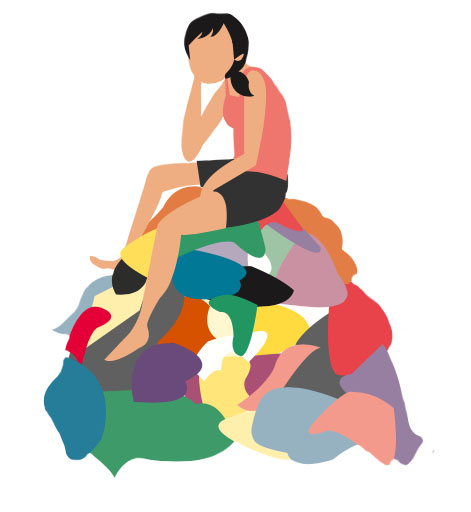Do you really NEED that?
Influencer culture leads to unsustainable consumer habits

With the increase of platforms like Instagram, TikTok, Facebook and other social media, an influx of content creators known as influencers has emerged.
This increasing influencer culture often causes blind consumerism — when audiences feel pressured to participate in material consumption.
Blind consumerism can lead to unsustainable consumption, meaning we are using resources that cannot sustain themselves at the rate we consume them. This habit can also lead to ecosystems being unable to cope with excessive resource extraction, resulting in biodiversity loss.
Although celebrity endorsement has long been popular with brands, this recent shift to e-commerce tools and influencers has led to everyday people wanting to be influenced by other “everyday people,” so these “relatable” influencers use their reputation and expertise in particular areas to engage with their followers by endorsing products.
Influencers will promote anything from makeup, clothes, music, even food. But with so many influencers overwhelming their audiences with all of these products, blind consumerism can occur.
For example, suppose you see your favorite influencer promoting a clothing brand, and he or she is showing off a nice fitting pair
of jeans. So you click the link in their bio and go buy the jeans, because you want to look like that, too — you want to be trendy, too.
After receiving the jeans you paid a questionable amount for just because the influencer promoted them, you find they don’t look quite like they did on the very highly paid influencer.
Shocking.
So now those jeans are sitting in the back of your closet right next to the other rejected items you bought because someone online told you to.
Furthermore, the brand the influencer was promoting was most likely a fast-fashion brand that capitalizes on influencer demand to provide for their audience by offering cheap and trendy clothing at a rapid pace.
It’s also important to note the fast fashion industry is expected to be responsible for a quarter of Earth’s carbon budget by 2050. This is what blindly consuming material items looks like.
It is unethical and unsustainable because did you really NEED those jeans? Probably not.
Did you really NEED that new makeup? Probably not.
Did you really NEED to buy those Bang Energy drinks on Amazon just because TikTok told you to? Probably not.
If you don’t believe me then take a look at the facts. With clothing in particular, we are consuming 400% more than what we were 20 years ago. This spike coincides with when influencers began to appear, and it’s understandable.
Seeing influencers never wear something twice and constantly posting hauls and promoting new products will inevitably achieve their goal: To influence.
Their audience will see the way they portray their lives on social media and
envy that. Then the influencees will blindly consume things they really don’t need and contribute to the cycle of bad consumerism.
Of course not all influencers are evil, but the markets they promote can be incredibly harmful. We need to work against blind consumerism and toward being “de-influenced” from unnecessary products.
Influencers need to start promoting sustainable shopping habits and industries, especially working toward dismantling fast fashion’s impact on society and the environment.

Ava McGuire is the Editor-in-Chief for The Tiger Print. This is her senior year and her third year on staff. Fun fact: Ava has lived in many places throughout...



